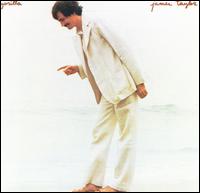From Wikipedia, the free encyclopedia
1975 studio album by James Taylor
Gorilla Released May 1975 (1975-05 ) Recorded March 17 – April 24, 1975 (1975-03-17 – 1975-04-24 ) Studio Warner Bros. Studios (North Hollywood) Genre Length 38 :46 Label Warner Bros. Producer
Gorilla James Taylor . Released in May 1975, it was more successful than Walking Man Mexico " and "How Sweet It Is (To Be Loved By You) ", rose to the top five on the Billboard Warner Bros. Records , his last being In the Pocket Gorilla showcased Taylor's electric, lighter side that became evident on Walking Man . The song "Sarah Maria" is about his daughter Sally (born Sarah Maria Taylor on January 7, 1974). His then-wife Carly Simon was featured on "How Sweet It Is (To Be Loved By You)", originally recorded by Marvin Gaye . Jimmy Buffett recorded "Mexico" on his 1995 album Barometer Soup [ 1]
All songs by James Taylor unless otherwise noted.
Side one "Mexico " – 2:57
"Music" – 3:46
"How Sweet It Is (To Be Loved by You) " (Holland-Dozier-Holland ) – 3:33
"Wandering" (Traditional; arrangement and additional lyrics: James Taylor) – 2:40
"Gorilla" – 3:10
"You Make It Easy" – 4:10 Side two ”I Was a Fool to Care " – 3:19
"Lighthouse" – 3:15
"Angry Blues" – 3:25
"Love Songs" – 5:45
"Sarah Maria" – 2:46 James Taylor – lead vocals, acoustic guitar (1, 2, 4, 5, 7–11), electric guitar (1), harmony vocals (2, 4, 5, 10, 11), arrangements (4), ukulele (5), high-string acoustic guitar (10)
Clarence McDonald – Fender Rhodes (2, 3, 6, 7), acoustic piano (3, 6)Nick DeCaro – accordion (4, 7, 11), string arrangements
Randy Newman – hornorgan (8)Danny Kortchmar – electric guitar (1, 3, 6)Al Perkins – pedal steel guitar (2, 10)David Grisman – mandolin (5, 11)Arthur Adams – electric guitar (7)Lowell George – electric guitar (9), harmony vocals (9)Leland Sklar – bass (1, 3, 7, 8, 11)Willie Weeks – bass (2, 5, 6, 9)Russ Kunkel – drums (1, 3, 7, 8, 10), shaker (1), tambourine (3), percussion (7), congas (10)Andy Newmark – drums (2, 5, 6, 9)Jim Keltner – drums (3)Milt Holland – percussion (1, 2, 9), wind chimes (10)Victor Feldman – percussion (9, 10), marimba (11)Gayle Levant – harp (1, 2, 10)
David Sanborn – saxophone (3, 6)Jules Jacob – clarinet (5, 10), oboe (10)
George Bohanon – trombone (7)Chuck Findley – trumpet (7)David Crosby – harmony vocals (1, 8)Graham Nash – harmony vocals (1, 8)Carly Simon – harmony vocals (3)Valerie Carter – harmony vocals (9)Producers – Russ Titelman and Lenny Waronker
Engineered, Mixed and Mastered by Lee Herschberg
Additional Engineer – Donn Landee
Assistant Engineer – Loyd Clifft
Recorded at The Burbank Studios (Burbank, CA).
Mixed and Mastered at Warner Bros. Recording Studios (Hollywood, CA).
Cover and Design – Mike Salisbury
Photography – Norman Seeff
^ Song & Lyrics Database – BuffettNews.com ^ https://www.allmusic.com/album/r19687/review ^ Larkin, Colin (2007). Encyclopedia of Popular Music Oxford University Press . ISBN 978-0195313734 ^ Gorilla – Rolling Stone ^ Christgau, Robert (1981). "Consumer Guide '70s: T" . Christgau's Record Guide: Rock Albums of the Seventies Ticknor & Fields . ISBN 089919026X . Retrieved March 15, 2019 – via robertchristgau.com.^ Graff, Gary; Durchholz, Daniel, eds. (1999). MusicHound Rock: The Essential Album Guide 1125 . ISBN 1-57859-061-2 ^ "James Taylor: Album Guide" . rollingstone.com . Archived from the original on January 5, 2013. Retrieved October 27, 2015 .^ Kent, David (1993). Australian Chart Book 1970–1992 (illustrated ed.). St Ives, N.S.W.: Australian Chart Book. p. 305. ISBN 0-646-11917-6 ^ "Top RPM Albums: Issue 4000a" . RPM Library and Archives Canada . Retrieved 5 January 2025.^ "James Taylor Chart History (Billboard 200)" . Billboard ^ "Top RPM Albums: Issue 6489a" . RPM Library and Archives Canada . Retrieved 5 January 2025.^ "Top US Billboard 200 Albums - Year-end 1975" . BestSellingAlbums.org . Retrieved 5 January 2025 .
Studio albums Live albums Holiday albums Compilation albums Extended plays Singles Other songs Related articles

